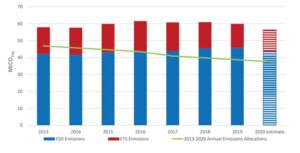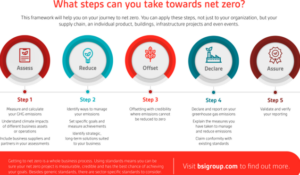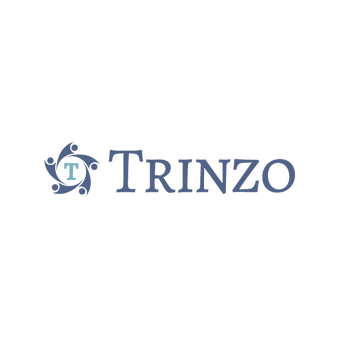SMEs need to realise that business as usual is obsolete
Ireland has agreed to a massive, transformative step change to reduce emissions to tackle climate change. We have done this globally through the Paris Climate Accord, regionally through the European Union and are putting binding targets in place nationally through the Climate Action Bill and Programme for Government.
The scale of the challenge
The challenge is to reach net-Zero by 2050. The challenge will be legally binding. The programme for Government target to achieve our Paris Accord commitment is for 7.1% reductions year on year. To put this reduction into context in 2020 when the Irish economy slowed, and transport ground to a halt due to the COVID-19 pandemic, Ireland’s greenhouse gas emissions only dropped by 5.9%.
This graph taken from the SEAI report estimates of energy and greenhouse gas emissions in 2020 shows that even with Ireland’s 5.9% decrease this year, the annual emissions are still far above the 2020 allocation.
Why SMEs
Small and medium Enterprises (SMEs) are those businesses with less than 50 employees and turnover below € 50 million. This transition cannot happen without the SME sector. CSO figures from 2019 showed that the SME sector accounted for 99.8% of the enterprises and employs 68% of employees. SMEs generated just over half (50.2%) of total turnover in the economy.
What is net-Zero
net-zero is where some greenhouse gases are put into the air but an equal amount of greenhouse gases are removed from the air.
Can we just continue as usual and hope technology will sort it out?
Nope. The carbon capture and storage has been promised for years but has almost always failed before it reached commercial operation. The reason is simple, it’s very very expensive. The bad news is that carbon capture and storage will only be viable if energy costs are extremely high. Does your business model work with high energy costs?
There are fortunes to be made and lost in this transition.
If your business is dependent on affordable fossil fuel energy you need to consider your future over the next 10 to 30 years. You need to be aware of the scale of the challenge. You need to think about your energy use and consider how it can be decarbonised.
Small incremental reductions will not be enough to reduce greenhouse gasses by 50% over the next 10 years (to 2030) and 100% over the following 20 years (to 2050).
Ah sure they’ve been talking about that for years and nothing has happened. I’ll believe it when I see it
It’s true that we have been talking about climate change but not actually doing anything about it for decades. That looks set to change. For nothing to happen now you would be betting on the EU not penalising Ireland for failing to meet it’s binding targets. I’m not sure that’s a safe bet.
Ok, but what should I be doing? Offsets maybe?
Stop burning stuff.
The best thing to do is to imagine that fossil fuels are really really expensive. You would probably look to reduce your use of fossil fuels and find alternatives.
How would this affect your business? Would you be able to buy in the same goods and services? Would you be able to provide others with the same goods or services you do now?
To look into this in a bit more detail you will need to measure exactly how much GHG you release directly, and also from the goods and services you buy. Then you need to look at how to reduce those numbers.
Offsetting is really a last resort as globally there is a limited amount of offsetting capacity available and a lot of “essential” activities which give off greenhouse gases which want to be offset.
As a general rule I am going to say that your SME is not “essential” and you should be looking to eliminate rather than offset your greenhouse gas emissions.
The BSI have developed the following framework to think about your organisation, supply chain, products, and buildings.
Resources
PAS 2050 Specification for the assessment of the life cycle greenhouse gas emissions of goods and services is available from the BSI as a free download
We can help you
If you are planning on staying in business over the next 30 years and would like to discuss further, Antaris Consulting have expertise available in sustainability, circular economy, resource efficiency, greenhouse gas assessment, life cycle analysis, and can help you look at your operations and develop a strategic plan towards net zero.




